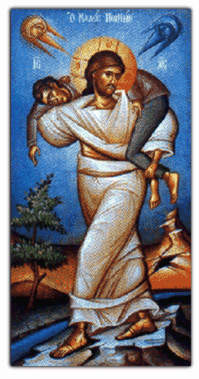Resolutions for the Family of God
 After witnessing some infighting recently between two members of a parish community over a parish social event, I commented to the pastor, “I sometimes think that the church is one big dysfunctional family.” Both of us started to laugh.
After witnessing some infighting recently between two members of a parish community over a parish social event, I commented to the pastor, “I sometimes think that the church is one big dysfunctional family.” Both of us started to laugh.
In our world today, our families gossip about each other; hold grudges; pit one member against the other; refuse to attend each other’s functions because of hurt feelings. We boycott family gatherings like weddings and funerals. We have members refusing to contribute to the maintenance of the house, being jealous about other people’s homes decor; become envious over who wears the more pretty clothes; is all too serious; is all too laid back; never find time to get to know each other; complain about politicians; fight to be in posts of leadership without any responsibility and the list goes on.
The same thing happens in our churches. Bad news gets out quickly; people are refused burial and marriage because their "dues are not current"; many refuse to attend services in another church outside their jurisdiction even in the same town. The refusal to attend a service for one who has left the congregation or faith for another parish or jurisdiction; the harsh criticism spoken about the hierarchy; the refusal to contribute time, talent or treasure to the work of the local church. We complain about the iconography and music style must be that of other churches or according to the latest trend; the vestments worn in church must have more shine and galloon to be liturgically correct. One never sits at a different parishioner’s table during coffee hour; people push their way into positions of leadership but never want to be servants to God’s people and the list goes on.
When conflict arises within a parish family, the trained eye of the shepherd is able to identify the problem and apply the necessary remedies given to us by Christ. When you think about it, conflict actually helps the servants of the church in their responsibilities because it exposes a clearer picture of the spiritual condition of their flock. Before any solution can be applied, the problem must be lifted up in prayer and careful thought given. Counsel from others may be sought, and the remedy must be applied with gentleness, respect, love and care. Applying the oil of mercy will lessen the friction between hot heads; goodness will melt away the hardness of hearts; kindness will allow the fresh air of grace to work; humility will acknowledge that nobody is perfect; brokenness will bring us to a level playing field; repentance will help all begin again and consign things to the past.
The history of the Church is one of struggle over this question, “And who do you say that I am?” (Matthew 16:15) Conflict over this issue was necessary because it helped clarify biblical truth as expressed in official orthodox catholic teaching concerning the nature of Christ, such was the case of the First Ecumenical Council held in the year 325 AD. This same question Jesus posed to His disciples almost two thousand years ago confronts us today. On a parish level, negative words and feelings among local body can create an atmosphere where this question is never even considered, “And who do you say that I am?” The foundation of the Church rests on the affirmation of the Apostle Peter that Jesus is "the Christ, the Son of the living God”(Matthew 16:16).
Christ is the purpose for forming a local church community. The Psalmist David reminds us “unless the Lord builds the house, the builders labor in vain” (Psalm 127:1). When conflict arises it is time for God is to be glorified. Placing our needs before the Throne will reap countless blessings. Jesus should not be left out of our decision-making.
Kindness toward those who disagree with you is the mark of a true Christian. Quoting the book of Proverbs, the Apostle Paul said "if your enemy is hungry, feed him; if he is thirsty, give him drink; for by so doing you will heap burning coals upon his head" (Proverbs 25:22; Romans 12:20). Heaping burning coals means to apply God’s burning love upon any adverse situation or life circumstance and get out of the way for God do His work. Only He can melt away the anger, mistrust, hurt and resentment that conflicting parties are experiencing.
 The Apostle Paul prefaces the above passage: “Let love be genuine; hate what is evil, hold fast to what is good; love one another with brotherly affection; outdo one another in showing honor. Never flag in zeal, be aglow with the Spirit; serve the Lord. Rejoice in your hope, be patient in tribulation, be constant in prayer. Contribute to the needs of the saints, practice hospitality. Bless those who persecute you; bless and do not curse them. Rejoice with those who rejoice, weep with those who weep. Live in harmony with one another; do not be haughty, but associate with the lowly; never be conceited. Repay no one evil for evil, but take thought for what is noble in the sight of all. If possible, so far as it depends upon you, live peaceably with all” (Romans 12:9-18).
The Apostle Paul prefaces the above passage: “Let love be genuine; hate what is evil, hold fast to what is good; love one another with brotherly affection; outdo one another in showing honor. Never flag in zeal, be aglow with the Spirit; serve the Lord. Rejoice in your hope, be patient in tribulation, be constant in prayer. Contribute to the needs of the saints, practice hospitality. Bless those who persecute you; bless and do not curse them. Rejoice with those who rejoice, weep with those who weep. Live in harmony with one another; do not be haughty, but associate with the lowly; never be conceited. Repay no one evil for evil, but take thought for what is noble in the sight of all. If possible, so far as it depends upon you, live peaceably with all” (Romans 12:9-18).
Jesus said, “Those who are well have no need of a physician, but those who are sick; I came not to call the righteous, but sinners” (Mark 2:17). Often we never think of ourselves as sinners, but only the other gal or guy. With all the harsh words, the complaining and countless hours, days or even years of mental anguish over others, did it actually change anything about your life? Has it made you a more compassionate and understanding person? Has it caused you to see your own faults and not judge others? Has it made you into a more Christ-like person? Unfortunately, finding fault with everybody else is trying to shift responsibility away from you, who one day will have to make an account for your own life before God.
God’s invisible grace is made visible through faith in action. The Parable of the Good Samaritan wonderfully illustrates this: "But a certain Samaritan, as he journeyed, came where he was. And when he saw him, he had compassion. So he went to him and bandaged his wounds, pouring on oil and wine; and he set him on his own animal, and brought him to an inn, and took care of him. On the next day, when he departed, he took out two denarii, and gave them to the innkeeper, and said to him, 'Take care of him; and whatever more you spend, when I come again, I will repay you" (Luke 10:33-35).
In this parable, the Samaritan represents Christ who cured the wounded man and led him to the Inn. It is evident here that Christ is presented as the Healer, the physician who cures the maladies of humanity; and the Church as the true hospital. Jesus can also be thought of as the One wounded on which the Samaritan found compassion. Remember what Jesus taught us, “Whatever you do to the least of these my brothers and sisters, you do it to Me” (Matthew 25:40).
The church is a place specializing in the mending of broken lives. Many of the miracles that take place there go unnoticed by the average parishioner because the inner man is being cleaned, transformed and renewed. The bishops and priests are the therapists for the people of God. They use the remedies of the sacraments, the proclaiming and preaching of the Word and special blessings to offer to each precious soul what they really need.
An ever-growing unity in your parish will be experienced when each person will acknowledge that we all need God; that we are sinners; that we have been paid for by a great price through Christ’s Blood (1 Corinthians 6:19-20); that we recognize, respect and understand the struggles of a fellow Christian in their daily walk and honor each other as children of God. As the local assembly of the Body of Christ, our churches must be that place of friendship, respect, solace, comfort, joy and peace so that those who enter may rest from the cares of the world.
Peace + be to your house! And to all who enter in!
©2005 - Raymond J. Mastroberte
12/9/05
HomePage
Archived Articles
 The Apostle Paul prefaces the above passage: “Let love be genuine; hate what is evil, hold fast to what is good; love one another with brotherly affection; outdo one another in showing honor. Never flag in zeal, be aglow with the Spirit; serve the Lord. Rejoice in your hope, be patient in tribulation, be constant in prayer. Contribute to the needs of the saints, practice hospitality. Bless those who persecute you; bless and do not curse them. Rejoice with those who rejoice, weep with those who weep. Live in harmony with one another; do not be haughty, but associate with the lowly; never be conceited. Repay no one evil for evil, but take thought for what is noble in the sight of all. If possible, so far as it depends upon you, live peaceably with all” (Romans 12:9-18).
The Apostle Paul prefaces the above passage: “Let love be genuine; hate what is evil, hold fast to what is good; love one another with brotherly affection; outdo one another in showing honor. Never flag in zeal, be aglow with the Spirit; serve the Lord. Rejoice in your hope, be patient in tribulation, be constant in prayer. Contribute to the needs of the saints, practice hospitality. Bless those who persecute you; bless and do not curse them. Rejoice with those who rejoice, weep with those who weep. Live in harmony with one another; do not be haughty, but associate with the lowly; never be conceited. Repay no one evil for evil, but take thought for what is noble in the sight of all. If possible, so far as it depends upon you, live peaceably with all” (Romans 12:9-18).  After witnessing some infighting recently between two members of a parish community over a parish social event, I commented to the pastor, “I sometimes think that the church is one big dysfunctional family.” Both of us started to laugh.
After witnessing some infighting recently between two members of a parish community over a parish social event, I commented to the pastor, “I sometimes think that the church is one big dysfunctional family.” Both of us started to laugh.